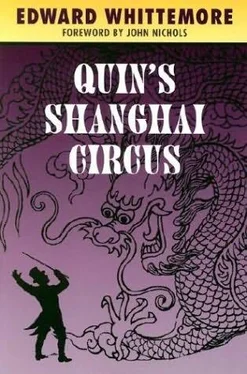Edward Whittemore - Quin’s Shanghai Circus
Здесь есть возможность читать онлайн «Edward Whittemore - Quin’s Shanghai Circus» весь текст электронной книги совершенно бесплатно (целиком полную версию без сокращений). В некоторых случаях можно слушать аудио, скачать через торрент в формате fb2 и присутствует краткое содержание. Жанр: Фэнтези, на английском языке. Описание произведения, (предисловие) а так же отзывы посетителей доступны на портале библиотеки ЛибКат.
- Название:Quin’s Shanghai Circus
- Автор:
- Жанр:
- Год:неизвестен
- ISBN:нет данных
- Рейтинг книги:3 / 5. Голосов: 1
-
Избранное:Добавить в избранное
- Отзывы:
-
Ваша оценка:
- 60
- 1
- 2
- 3
- 4
- 5
Quin’s Shanghai Circus: краткое содержание, описание и аннотация
Предлагаем к чтению аннотацию, описание, краткое содержание или предисловие (зависит от того, что написал сам автор книги «Quin’s Shanghai Circus»). Если вы не нашли необходимую информацию о книге — напишите в комментариях, мы постараемся отыскать её.
Quin’s Shanghai Circus — читать онлайн бесплатно полную книгу (весь текст) целиком
Ниже представлен текст книги, разбитый по страницам. Система сохранения места последней прочитанной страницы, позволяет с удобством читать онлайн бесплатно книгу «Quin’s Shanghai Circus», без необходимости каждый раз заново искать на чём Вы остановились. Поставьте закладку, и сможете в любой момент перейти на страницу, на которой закончили чтение.
Интервал:
Закладка:
Father, said Quin, it was Geraty who recommended me to you.
The old priest smiled gently.
I see. Well just let me think for a moment, I’m quite certain I can remember him. Names come back to me slowly, but they always come back. Perhaps you could just refresh my memory. What was he doing before the war?
He sold patent drugs. Eventually he left Tokyo and went to Mukden and then to Shanghai.
Mukden and Shanghai? A man who carried a valise for his samples? Yes, I believe I remember him. He came to my Friday night meetings.
Which meetings were those, Father?
The Legion meetings, the Legion of Mary. After the meetings ended there would be a discussion on No drama, and if we had happened to have seen a fire earlier in the evening the discussions were exceptionally spirited. I can recall him quite clearly now. He was a spare, large-boned man, very tall and very lanky, quiet, rather pale. Introspective and solemn, sometimes too solemn, I had to warn him not to be morose in his attitude toward religion. After all, it should be a happy part of our lives. Of course he wore stylish suits and flamboyant ties to make himself appear vain and worldly, but that was just to hide the truth about himself. How he suffered, that man. Did you know, by the way, that they placed cannons around the Shinto shrines in the thirties? Decrepit artillery pieces captured from the Russians in 1905?
When did you last see him, Father?
Henry?
No, Geraty.
Oh yes, I see. Well the last time would have been the morning he came here with his valise and was afraid to open it. The day he broke down and cried.
And when was that, Father?
Before the war, naturally. A good thirty years ago. And then before that I had my studies in Kamakura, where the temples in the hills were so beautiful, and the pine groves and the views of the sea, and the gongs and rituals and the hours set aside for contemplation. And then before that in the thirteenth century military dictators seized power and threw the Emperor out in the streets where he had to bugger his autograph and barter his pickle for rice. Since then I’ve been a strict vegetarian, honey and eggs ex-cepted.
Father?
Henry was the last Emperor I talked to, although of course Manchukuo was only a mythical country. Henry wouldn’t admit that naturally, Henry was a very naughty man. But admit it or not, the truth was still the same. There’s no escaping the fact that Henry was out in the streets like the rest of us.
It took Quin many hours and many trips to the Victorian parlor to gather even a few facts from the old priest, so accustomed had he become to dwelling in the familiar terrain of some faraway kingdom that had long ago become a private domain. But even a few facts were enough to make it clear that Geraty had lied when he claimed he had learned about the espionage network from Father Lamereaux.
The Jesuit had never described the famous picnic on the beach in Kamakura to Geraty, never mentioned Adzhar’s name, never told Geraty about the dead-drop device he had invented, never said anything to Geraty about any aspect of the clandestine work in which he was involved.
Yet other parts of Geraty’s account were accurate. In fact, there had been a meeting in a Tokyo cemetery one night between Father Lamereaux and a young Japanese army corporal, little more than a boy, who was working for the spy ring as a courier. And the corporal was the same young boy whom Geraty had met earlier in the cemetery, the boy to whom he had given a packet of stolen money in exchange for what he thought would be a valuable cache of pornographic films waiting for him in Mukden. The boy had passed on the money to Father Lamereaux before dropping his trousers and bending over a tombstone to receive the bamboo microfilm device, subsequently traveling to Manchuria where he was caught soon after his arrival in Mukden and beaten to death by the Kempeitai, an incident that had produced the one vague report on the ring to be found in the files of the Kempeitai after the war.
But Father Lamereaux didn’t know Geraty had witnessed that scene in the cemetery. He didn’t know the source of the money given to him by the corporal. He didn’t know Geraty had watched him accept the packet and watched him insert the bamboo device with a deft flickering motion, that he had then fallen asleep listening to Father Lamereaux sing the Litany of the Saints to himself on his knees in the darkness.
On the contrary, it was Geraty who had confessed his secrets over two bottles of Irish whiskey the following day.
The two men first became acquainted when Geraty began attending the Legion meetings the priest held in his home on Friday evenings. Geraty affected the manner and clothes of a successful salesman, but Lamereaux suspected this bluff appearance had nothing to do with his true nature. He soon discovered Geraty was a sensitive man who tormented himself with obscure spiritual concerns that even to a Jesuit seemed remote. Obviously there was a contradiction in his gloomy approach to life. Geraty would never admit it, but the priest felt it had to do with religion. For some reason he sensed that Geraty yearned for a religious vocation yet at the same time could not bring himself to accept his natural inclinations.
Geraty had a great interest in No although Lamereaux didn’t discover this until the very last time they were together. Lamereaux was the spiritual director of the Tokyo presidium of the Legion of Mary, Geraty became its treasurer. While Lamereaux delivered an exhortation at the Friday night meetings, Geraty passed around under the table the secret-bag for the members’ contributions. He then left the house immediately after the meeting, claiming he had work to do. Thus he always missed the discussions on No led by Lamereaux.
A regional senatus of the various Asian presidia of the Legion was to be held in Shanghai. Geraty, who said he was due to make a business trip to Shanghai at about that time, was elected to be the Tokyo Legion’s delegate to the senatus.
The day before he was scheduled to leave for the mainland he turned up at Lamereaux’s house early in the morning. He seemed very agitated. Under his arm was the valise he used to carry his samples. Lamereaux wasn’t feeling at all well that day, but when Geraty begged to be allowed to stay for a few hours, to be near a friend as he said, the priest put aside his own concerns to make him welcome.
Geraty drank tea and chewed fistfuls of aspirins. The pain in his face was evident, but it was just as evident that his suffering was more than physical. He was severely troubled.
Lamereaux invited him into the parlor. The moment Geraty laid eyes on the long table at the end of the room, the table where it was his duty to pass the secret-bag to the legionaries on Friday evenings, he buried his head in his hands and began to cry. Lamereaux gently bade him sit down and unburden himself. After sobbing helplessly for ten or fifteen minutes Geraty finally began to whisper.
He spoke first of an inconsequential matter. For some time he had been in the habit of going directly from the Friday night meetings of the Legion to Yoshiwara, the licensed quarter, to proselytize the harlots there. He would stand in the middle of the street facing a row of brothels and deliver a long sermon in a voice loud enough to be heard in every room.
Because he was such a large man, not only a giant but a foreign giant who spoke fluent Japanese, there was considerable curiosity over this spectacle. Often there would be hundreds of faces gazing down at him from the windows. Geraty began his preaching at midnight, when there was more chance the customers would be sleeping and the prostitutes would have time to listen.
Father Lamereaux knew that this was what Geraty had been doing after he left the Friday night meetings of the Legion. Such an activity was too flagrant not to be noticed at once and brought to his attention by his Japanese acquaintances. He had heard about it several years before and he didn’t like it. He found it overzealous and unseemly and not at all consonant with Japanese sensibilities. But because it obviously lifted Geraty’s spirits he allowed it to continue.
Читать дальшеИнтервал:
Закладка:
Похожие книги на «Quin’s Shanghai Circus»
Представляем Вашему вниманию похожие книги на «Quin’s Shanghai Circus» списком для выбора. Мы отобрали схожую по названию и смыслу литературу в надежде предоставить читателям больше вариантов отыскать новые, интересные, ещё непрочитанные произведения.
Обсуждение, отзывы о книге «Quin’s Shanghai Circus» и просто собственные мнения читателей. Оставьте ваши комментарии, напишите, что Вы думаете о произведении, его смысле или главных героях. Укажите что конкретно понравилось, а что нет, и почему Вы так считаете.












